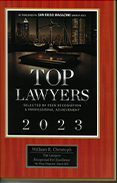How a California record expungement can help with your job search
New California laws confirm that expungement relief extends to the employment process. Ban-the-box legislation is also limiting when employers ask about criminal history.
In January, a new law went into effect that broadened the relief offered by a criminal record expungement in California. The new law prohibits employers from using an expunged conviction when making hiring decisions.
The law, known as SB530, amended California’s Labor Code 432.7 to prohibit employers (including public agencies and private corporations and individuals) from using the following records as factors in hiring decisions:
- An arrest that did not lead to a conviction
- Participation in a diversion program (either pretrial or post-trial)
- A conviction judicially dismissed, expunged or ordered sealed
The new statute confirms that the relief provided by an expungement extends to the hiring process.
In addition, consumer-reporting agency cannot provide an employer with conviction information dating back more than seven years in a background check. However, employers may still ask about older convictions and can directly request such older records from the state.
The law includes several exceptions including one for jobs that require the use of a firearm in the course of employment. Even with the exceptions, the law has greatly increased the value of a California expungement.
Ban-the-box legislation
On July 1, 2014, another measure went into effect statewide that limits when public sector employers can ask about criminal history. The measure, AB218, requires that a state or local agency employer first look at whether the job candidate meets minimum qualifications before asking about a criminal record. The change does not apply for some law enforcement jobs or positions working with children, the elderly and disabled.
San Francisco recently passed an even stricter ban-the-box law that went into effect on August 13, 2014. The measure bans private employers from asking conviction-related questions until after a first in-person interview or conditional offer of employment. The Board of Supervisors approved the ordinance unanimously.
Shortened waiting period for certificate of rehabilitation
In addition to the limits on what records employers may consider, SB530 also decreased the waiting period for a certificate of rehabilitation. The certificate of rehabilitation is helpful in showing that a person has turned his or her life around. It has the added weight of being a finding from the court that the person has been rehabilitated after a criminal conviction.
In the past, a person needed to wait at least seven years after receiving a discharge from probation, release on parole or custody to apply. The new law amended the California Penal Code to allow trial courts the ability to grant applications before seven years when it serves the interests of justice.
Penalties for employer violations
An intentional violation of the law is a misdemeanor offense with a fine up to $500. If a pattern emerges that certain employers routinely violate the law, state or city attorneys may bring lawsuits.
Clearing a criminal record might help you find a job, but also could be needed for employment licensing or immigration reasons. If you have questions about cleaning up your record, contact an experienced California expungement attorney who can explain your options.
Keywords: Record expungement, ban-the-box laws, hiring process







